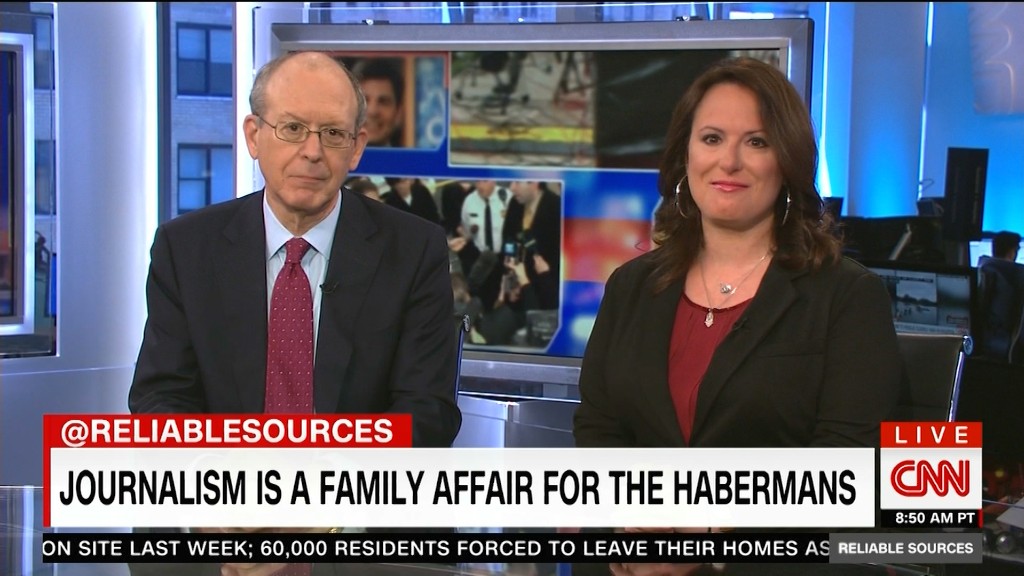
Clyde Haberman has seen a lot in his 40 years writing for The New York Times, but he had never seen this.
On August 21, Haberman shared the Times' esteemed front page with one of his daughters, the President Trump chronicler Maggie Haberman.
It was "a hell of a source of pride," he said, so much so that "I asked Al Siegal, our former standards editor, who goes way back. He couldn't think of another parent-child combo."
Father and daughter Haberman sat down for a joint interview for this Sunday's "Reliable Sources." The conversation was so fascinating that we decided to publish the whole thing as a podcast.
Listen to the whole podcast here:
Journalism was a calling not just for Maggie and Clyde but also for Maggie's brother Zach. He's the head of content at the New York Daily News.
While Clyde doesn't take credit for his offspring's interest in the profession, he said journalism is "a passport to the world" and "the best ring-side seat you could ever have."
Maggie said her father was "always just incredibly focused on the story," whether as a foreign correspondent or a columnist.
Many people would say the same thing about her work today. Maggie joined the paper in 2015 after stints at the New York Post, the New York Daily News and Politico. This year, often working with colleagues on the Trump beat, she has produced one bombshell story after the other. The Times recently dubbed her the "Trump Whisperer."
"She's an extraordinary reporter," her father said. "I think I could still hold my own in a writing game, but she's the best reporter I've ever seen."
Double Habermans on the front page
Journalists oftentimes measure themselves by bylines. And the Habermans enjoyed the remarkable moment when both their bylines were featured on page one of The Times. Maggie, along with Jeremy W. Peters, had a story about how the violence in Charlottesville influenced the timing of Steve Bannon's departure from the White House; Clyde had an obit of Dick Gregory, an acclaimed African-American comedian and social activist.
Clyde tweeted about the thrill of sharing the front page with Maggie.
"Within a space of about 24 hours, the number of my Twitter followers increased by 1,800," he said, crediting the surge with his daughter's social media influence.
"To some degree, quite frankly, it still amazes me that both of them went into journalism," Clyde said, reminiscing about his years on assignment in foreign capitals as Maggie and her brother were growing up. "There were plenty of positives" to being the child of a foreign correspondent, he said, "but there was also a negative side, including that I often disappeared for long stretches."
Maggie, a mother of three in New York City, said she tries to "disappear as infrequently as possible," but frequently has to travel to Washington to cover the Trump presidency.
"I do most things to extremes. So I work to extremes," she said, acknowledging that "my kids have gotten a little frustrated with it."
It's a balancing act that her father understands.
Learning to cover Trump
Covering New York City and its many characters, including Donald Trump, for the Post and the Daily News prepared Maggie for a job covering the Trump presidency.
She sees a stylistic similarity between Ed Koch, who she described as "a showy mayor, very interested in making a splash," and President Trump.
"I do think that Ed Koch helped inform his thinking about how a politician behaves," she said.
Maggie believes that journalists sometimes get too caught up in a narrative about Trump's volatility, without properly contextualizing him.
"The thing about Trump that we all always write is that he changes his mind all the time," she said. "That can be true, but it is also true that he has had a series of gut impulses that have been consistent since the 1980s and late 1970s. It's really important to always track back to that, to understand what you're seeing."
Clyde said what he appreciates most about Maggie's coverage of Trump is her "eminent fairness."
"I know she's a woman with opinions, but you're not going to really discern them very easily in neither her writing or her talking," he said.
Along with her full-time job at the Times, Maggie is a CNN political analyst.
Clyde said Maggie is "more dogged and relentless" in her reporting than he ever was: "I was so floored reading -- in one interview that Maggie gave -- she said she was calling about 50 people a day."
"I didn't say calling, I said I 'communicate with,'" Maggie said.
"Your thumbs do the walking?" he said, glancing at Maggie's phone.
"Right, my thumbs do a lot of the walking," she said, smiling at him.
Journalism in the age of Twitter
Clyde, who spent most of his career in the pre-social media era of journalism, says computerization has "changed things very dramatically" at the Times -- mostly for the better.
"Anybody who calls the New York Times the 'gray lady' today is just being foolish," he said.
The paper's international footprint and coverage of social issues makes it "anything but" gray, he said, and to those who are nostalgic for what the Times used to be: "Get over it."
Maggie relies on Twitter and other digital tools to report and communicate with sources. (Since her father has a similar Times email address, he sometimes gets emails intended for her!)
Maggie is envied for her constant use of Twitter, but she cautioned against using Twitter carelessly. With "half-baked news" and quotes ricocheting around on the social network, "it's important to take a few extra minutes to dissect it and make sure it's the truth," she said.
Listen to the full podcast here and subscribe on iTunes here.


